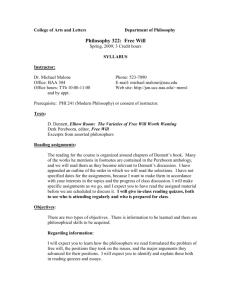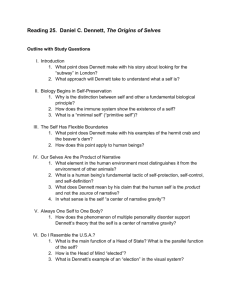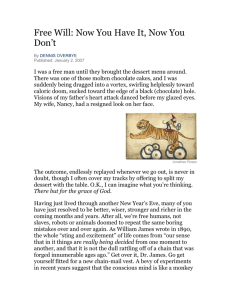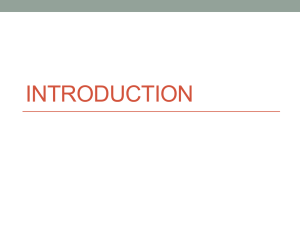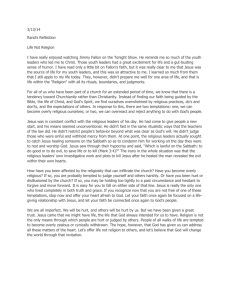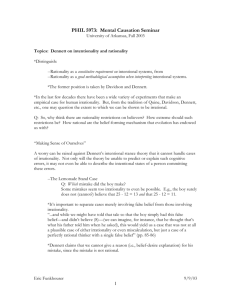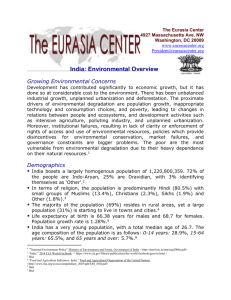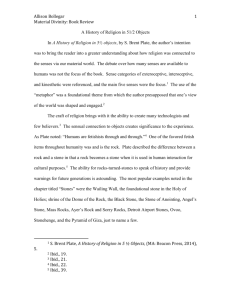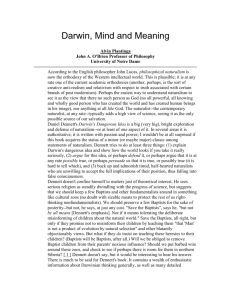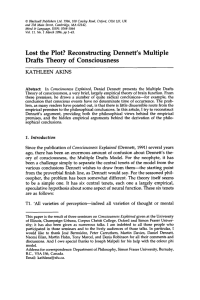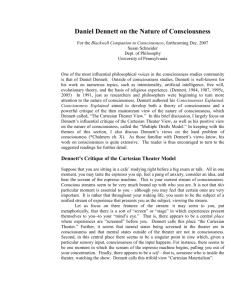sermon_08-26-2007_McLennan
advertisement
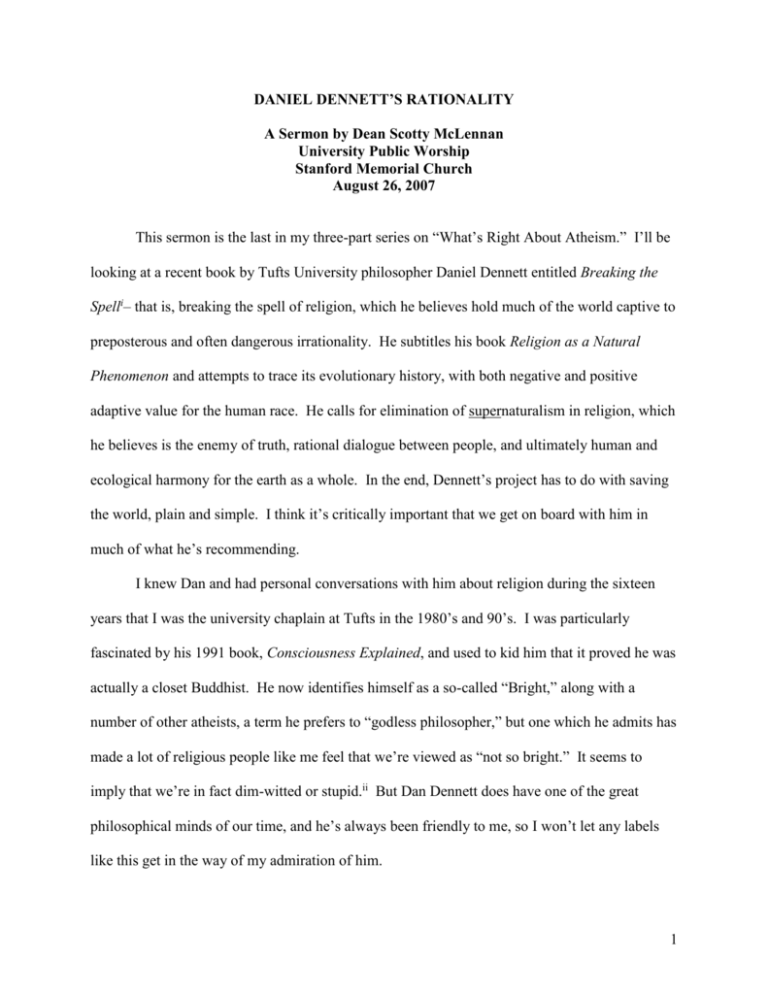
DANIEL DENNETT’S RATIONALITY A Sermon by Dean Scotty McLennan University Public Worship Stanford Memorial Church August 26, 2007 This sermon is the last in my three-part series on “What’s Right About Atheism.” I’ll be looking at a recent book by Tufts University philosopher Daniel Dennett entitled Breaking the Spelli– that is, breaking the spell of religion, which he believes hold much of the world captive to preposterous and often dangerous irrationality. He subtitles his book Religion as a Natural Phenomenon and attempts to trace its evolutionary history, with both negative and positive adaptive value for the human race. He calls for elimination of supernaturalism in religion, which he believes is the enemy of truth, rational dialogue between people, and ultimately human and ecological harmony for the earth as a whole. In the end, Dennett’s project has to do with saving the world, plain and simple. I think it’s critically important that we get on board with him in much of what he’s recommending. I knew Dan and had personal conversations with him about religion during the sixteen years that I was the university chaplain at Tufts in the 1980’s and 90’s. I was particularly fascinated by his 1991 book, Consciousness Explained, and used to kid him that it proved he was actually a closet Buddhist. He now identifies himself as a so-called “Bright,” along with a number of other atheists, a term he prefers to “godless philosopher,” but one which he admits has made a lot of religious people like me feel that we’re viewed as “not so bright.” It seems to imply that we’re in fact dim-witted or stupid.ii But Dan Dennett does have one of the great philosophical minds of our time, and he’s always been friendly to me, so I won’t let any labels like this get in the way of my admiration of him. 1 Dennett is deeply disturbed, to the point of exasperation, by people who unapologetically take things on blind faith, without subjecting them to logical, scientific and historical confirmation. First of all, “blind faith secures its own perpetuation by the simple unconscious expedient of discouraging rational inquiry.”iii Second, the victim is the ideal of truth-seeking and truth-telling.iv Third, blind faith often leads to fanaticism which injures others.v And fourth, how could any God be worth worshipping possibly be pleased by unreasoning veneration, when we humans have been given the most advanced brains on the planet and the capability of using them?vi Along these lines, my own college chaplain, William Sloane Coffin, used to condemn blind belief by saying, “It is right to be stabbed by doubt. It’s wrong to require certitude to the point of blind stupidity. And it is dangerous. If God is like a marine sergeant who has been handed a bunch of hopeless recruits, then those who believe in such a God will become soldiers prepared to do almost anything they’re told, no matter what, no matter to whom.”vii Coffin went on to say that “Christians have to listen to the world as well as to the Word – to science, to history, to what reason and our own experience tell us. We do not honor the higher truth we find in Christ by ignoring truths found elsewhere.”viii Dennett compares religious faith to falling in love.ix (250) “But, sad to say, even if it is true that nothing could matter more than love, it wouldn’t follow from this that we don’t have reason to question the things that we, and others, love. Love is blind, as they say, and because love is blind, it often leads to tragedy.”x He also asks us to imagine loving music more than anything else: “I [then] should be able to live my life in pursuit of the exaltation of music, the thing I love most, with all my heart and soul. But that still doesn’t give me the right to force my children to practice their instruments night and day, or the right to impose musical education on 2 everybody in the country of which I am the dictator, or to threaten the lives of those who have no love of music. If my love of music is so great that I am simply unable to consider its implications objectively, then this is an unfortunate disability, and others may with good reason assert the right to act as my surrogate, conscientiously deciding what is best for all, since … I cannot rationally participate in the assessment of my own behavior and its consequences.”xi I believe this is what’s happening in today’s gospel lesson from Luke.xii The leader of the synagogue in which Jesus is teaching is circumvented by Jesus, who in effect becomes his surrogate. The leader is indignant because Jesus is violating religious law by working on the Sabbath in curing a woman who’s unable to stand up straight – laying his hands on her and apparently doing some early chiropractice or perhaps massage. The religious leader’s love of the Ten Commandments – “Remember the Sabbath day and keep it holy”xiii -- gets in the way of his appreciation of Jesus’ humane act in healing a suffering woman. The commandment clearly states that “Six days you shall labor and do all your work. But the seventh day is a Sabbath to the Lord your God; you shall not do any work.”xiv As the leader kept saying to the crowd surrounding Jesus, “There are six days on which work ought to be done; come on those days and be cured, and not on the Sabbath day.”xv Yet, Jesus is not a man of blind faith. He’s not a fundamentalist or a biblical literalist. In fact, he uses logic, common sense, practical experience, and basic humanity in making his case for ignoring the biblical commandment: “Does not each of you on the Sabbath untie his ox or his donkey from the manger and lead it away to give it water? And ought not this woman…be set free from this bondage on the Sabbath day?”xvi Jesus could have gone on with his rational argument, referencing other biblical texts – say, something from the prophetic tradition like the words Richard Duncan read earlier from Isaiah:xvii “Satisfy the needs of the afflicted, [and] then your light shall rise in the darkness.”xviii 3 Dennett has been criticized for not recognizing that he has the kind of faith in science that religious people have in the dogma of their tradition. For example, he desperately wants people to understand and accept evolutionary theory: “I believe that their salvation may depend on it! How so? By opening their eyes to the dangers of pandemics, degradation of the environment, and loss of biodiversity, and by informing them about some of the foibles of human nature. So isn’t my belief that belief in evolution is the path to salvation a religion? No; there is a major difference. We who love evolution do not honor those whose love of evolution prevents them from thinking clearly and rationally about it! On the contrary, we are particularly critical of those whose misunderstandings and romantic misstatements of those great ideas mislead themselves and others. In our view, there is no safe haven for mystery or incomprehensibility. Yes, there is humility, and awe, and sheer delight, at the glory of the evolutionary landscape, but it is not accompanied by, or in the service of, a willing (let alone thrilling) abandonment of reason.”xix Similarly, Dennett explains that beliefs about the truths of physics, from theories about gravity to atoms to relativity, is “a place where the rubber meets the road” by comparison to claimed religious truths. Some religious people may believe that they’ve been made miraculously invulnerable to arrows or may have given all their belongings away in anticipation of the imminent End of the World. But beliefs in physics must be relied upon to build bridges that don’t collapse and to construct spacecraft that can fly people safely to the moon and back.xx Rationality is critical to human life and its flourishing. So, where does this leave religion? Well, for one thing, Dennett reminds us that ”Many deeply religious people have all along been eager to defend their convictions in the court of reasonable inquiry and persuasion…Every religion – aside from a negligible scattering of truly 4 toxic cults – has a healthy population of ecumenical-minded people who are eager to reach out to people of other faiths, or no faith at all, and consider the moral quandaries of the world on a rational basis.”xxi He cites, for example, those who gathered at the Parliament of World Religions in Barcelona in 2004, carrying on a tradition that goes back to the first Parliament at the Chicago world’s fair in 1893.xxii Dennett also reminds us of “the daily actions of religious people [who] have accomplished uncounted good deeds throughout history, alleviating suffering, feeding the hungry, caring for the sick. Religions have brought the comfort of belonging and companionship to many who would otherwise have passed through this life all alone, without glory or adventure. They have not just provided first aid, in effect, for people in difficulties; they have provided the means for changing the world in ways that remove those difficulties.”xxiii Religion may also simply be good for your health. Dennett cites “growing evidence that many religions have succeeded remarkably well on this score, improving both the health and morale of their members, quite independently of the good works they may have accomplished to benefit others… Moreover, the defenders of religion can rightly point to less tangible but more substantial benefits to their adherents, such as having a meaning for their lives provided!”xxiv Yet, the central and critical point that Dennett insists upon remains: that religion is the most prolific source of the “moral certainties” and “absolutes” that zealots depend on. In the world of religion, “people are dying and killing” in the name of blind faith and unapologetic irrationality.xxv Science and scientific method, which among other things could lead to medical advances and ecological solutions, are under fire from scriptural literalists. Supernaturalism is creating false and dangerous reliance on supposed divine intervention through miracles and providential events, rather than encouraging human beings to roll up their sleeves and work 5 together as stewards of the creation that we ourselves are destroying. All of us -- bright atheists and committed religionists – need to wake now and hear the earth call (in the words of the next hymn). We need to give and receive as love shows us how, join with each pilgrim who quests for the true, give heed to the voices of the suffering, awaken our consciences with justice as our guide, and work toward a planet transformed by our care.xxvi May it be so! 6 NOTES i Daniel C. Dennett, Breaking the Spell: Religion as a Natural Phenomenon (New York: Viking, 2006). ii Ibid., p. 21. iii Ibid., p. 230, quoting Richard Dawkins. iv Ibid., p. 203. v Ibid., p. 13. vi Ibid., p. 298. vii William Sloane Coffin, Credo (Louisville, Westminster John Knox Press, 2004), p. 157. viii Coffin, Credo, p. 145. ix Dennett, Breaking the Spell, p. 250. x Ibid.,, p. 254. xi Ibid., xii Luke 13: 10-17. xiii Exodus 20: 8. See also Deuteronomy 5: 12. xiv Exodus 20: 9-10. See also Deuteronomy 5: 13-14. xv Luke 13: 14. xvi Luke 13: 15-16. xvii Isaiah 58: 9b-14. xviii Isaiah 58: 10. xix Dennett, Breaking the Spell, p. 268. xx Ibid., p. 233. xxi Ibid., p. 297. xxii Ibid. xxiii Ibid., p. 253. xxiv Ibid., pp. 272, 276. xxv Ibid., p. 285. xxvi Thomas J.S. Mikelson, “Wake, Now, My Senses,” in Singing the Living Tradition (Boston: Beacon Press, 1993), #298. 7
